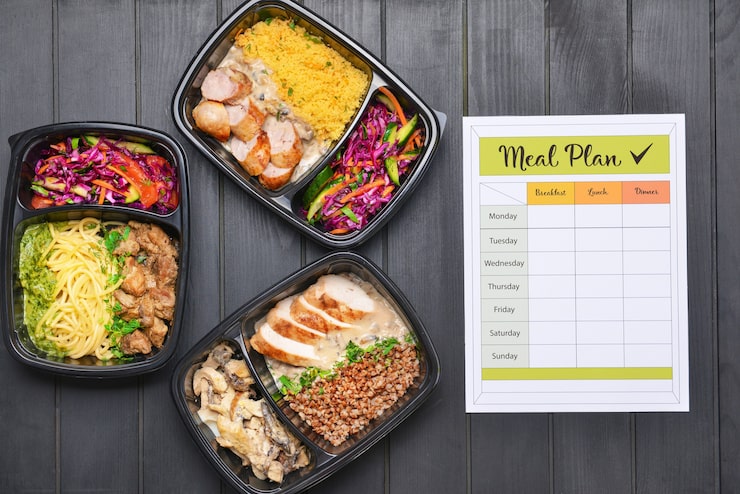Navigating college life is an exciting journey filled with new classes, friends, and experiences. Amidst the late-night study sessions and busy schedules, maintaining healthy student eating habits can often feel like an impossible task. Between tight budgets, limited cooking facilities, and the constant temptation of fast food, it’s easy to let nutrition fall by the wayside. However, what you eat directly impacts your energy levels, focus, and academic performance.
This guide will provide you with practical strategies to build a sustainable and enjoyable approach to food. We will explore how to create a balanced diet, make smarter food choices, and incorporate mindful eating into your daily routine. With the right tools and knowledge, you can fuel your body and mind for success without breaking the bank.
Why Healthy Eating Matters for Students
The connection between diet and brain function is well-established. The food you consume provides the essential nutrients your brain needs to concentrate, process information, and retain knowledge. A diet high in processed foods, sugar, and unhealthy fats can lead to energy crashes, brain fog, and difficulty concentrating during lectures.
On the other hand, a nutrient-rich diet supports cognitive function and stabilizes energy levels throughout the day. It improves memory, enhances mood, and strengthens your immune system, which means fewer sick days and more time focused on your studies. Adopting good eating habits now also sets a foundation for long-term health and well-being long after you graduate.
The Challenge: Why Is Healthy Eating So Hard in College?
Many students arrive on campus with the best intentions, but reality quickly sets in. The pressures of academic life, social commitments, and financial constraints create a perfect storm for poor dietary choices. Understanding these obstacles is the first step toward overcoming them.
Why do students struggle to eat healthy while staying on budget?
This is a common and valid concern. The perception that healthy food is expensive often steers students toward cheaper, less nutritious options. Fast food value menus and instant noodles seem like budget-friendly solutions, but their long-term costs to your health and academic performance are high. Additionally, students often lack the basic cooking skills or equipment needed to prepare meals, making pre-packaged and takeout foods the default choice.
The key to overcoming this is smart planning. Buying staple ingredients in bulk, such as rice, oats, beans, and pasta, can be very cost-effective. Shopping for seasonal fruits and vegetables, utilizing student discounts at grocery stores, and learning to cook simple, versatile meals are all effective strategies for eating well on a student budget.
Building a Balanced Diet for College Students
A balanced diet for college students doesn’t have to be complicated. The goal is to include a variety of foods from all major food groups to ensure you get the vitamins, minerals, and energy you need to thrive. Think of your plate as a simple framework.
- Lean Proteins: These are the building blocks for your body and help keep you full. Include sources like chicken, fish, beans, lentils, tofu, and eggs in your meals.
- Complex Carbohydrates: Forget the idea that all carbs are bad. Complex carbs like whole-wheat bread, brown rice, quinoa, and oats provide sustained energy. They prevent the sugar crash associated with simple carbs found in sugary snacks and drinks.
- Healthy Fats: Fats found in avocados, nuts, seeds, and olive oil are crucial for brain health. They help with nutrient absorption and keep you feeling satisfied.
- Fruits and Vegetables: Aim to fill half your plate with colorful fruits and vegetables. They are packed with vitamins, minerals, and fiber. Frozen fruits and vegetables are just as nutritious as fresh ones and are often more affordable.
Healthy vs. Fast Food Choices: Making Smarter Decisions
The allure of fast food is undeniable—it’s quick, cheap, and readily available. However, making a conscious decision in the healthy vs fast food choices debate is critical for your well-being. Most fast-food meals are high in calories, sodium, and unhealthy fats, while offering little nutritional value.
Instead of defaulting to a drive-thru, consider healthier alternatives that are just as convenient. Many grocery stores now offer pre-cut vegetables, rotisserie chickens, and prepared salads. Keeping healthy snacks on hand, such as apples, bananas, yogurt, or a handful of nuts, can help you avoid a last-minute fast food run when hunger strikes. When you do opt for fast food, look for grilled options over fried, choose water instead of soda, and ask for sauces on the side.
Quick and Nutritious Options for College Life
Time is a student’s most precious resource. The idea of cooking an elaborate meal after a long day of classes is often unrealistic. This is where planning for convenience meals for busy students becomes a game-changer.
What are the best quick yet nutritious options for college life?
Here are some simple meal ideas that are both fast and healthy:
- Overnight Oats: Combine rolled oats, milk (or a dairy-free alternative), and a scoop of protein powder or yogurt in a jar. Add fruit or nuts and let it sit in the fridge overnight. In the morning, you have a ready-to-eat breakfast.
- Quick Stir-Fries: Sauté your favorite vegetables with a source of protein like tofu or chicken. Add a simple sauce made from soy sauce, ginger, and garlic, and serve over brown rice. This entire meal can be ready in under 20 minutes.
- Loaded Sweet Potatoes: Microwave a sweet potato until tender. Top it with black beans, corn, salsa, and a dollop of Greek yogurt for a filling and nutrient-dense meal.
- Smart Snacking: Keep your dorm room stocked with easy-to-grab snacks like rice cakes with peanut butter, hard-boiled eggs, baby carrots with hummus, and trail mix.
Embracing a Mindful Eating Student Lifestyle
How you eat is just as important as what you eat. A mindful eating student lifestyle involves paying full attention to your food, from the moment you prepare it to the moment you eat it. It means putting away distractions like your phone or laptop and truly savoring each bite.
Mindful eating helps you recognize your body’s hunger and fullness cues more accurately, which can prevent overeating. It also fosters a healthier relationship with food, transforming meals from something you rush through into a moment of nourishment and self-care. Try to eat slowly, chew your food thoroughly, and notice the flavors and textures. This simple practice can reduce stress and improve digestion.
Studelicious: Your Partner in Healthy Eating
We know that building new habits can be challenging, which is why we created Studelicious. Our platform is designed to make healthy eating simple and accessible for students. The Studelicious app offers easy-to-follow recipes, budget-friendly meal plans, and grocery lists tailored to the student lifestyle. Whether you need a 10-minute breakfast idea or a plan for a week’s worth of dinners, Studelicious is here to support your journey toward better health.
By integrating these strategies, you can establish healthy student eating habits that will not only enhance your academic experience but also benefit you for years to come.





